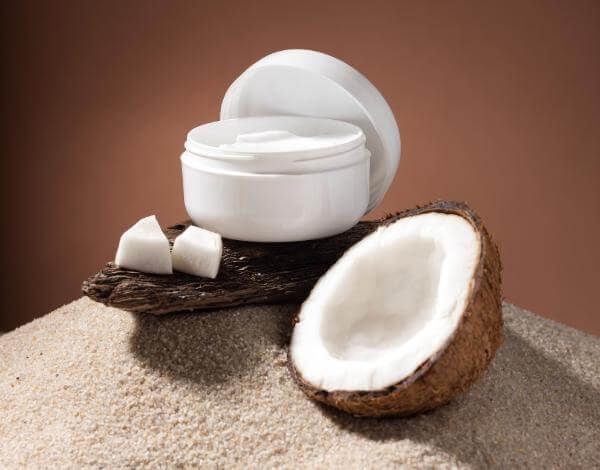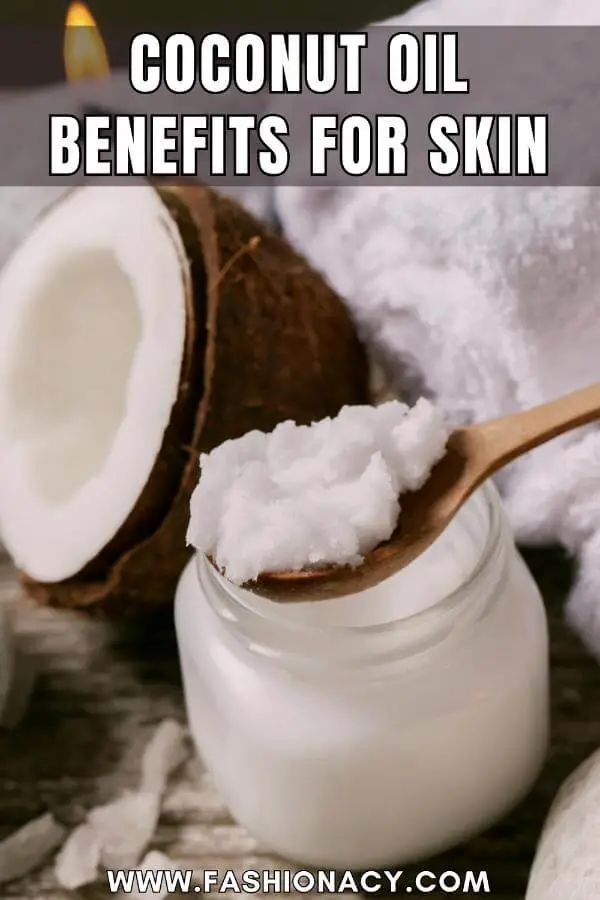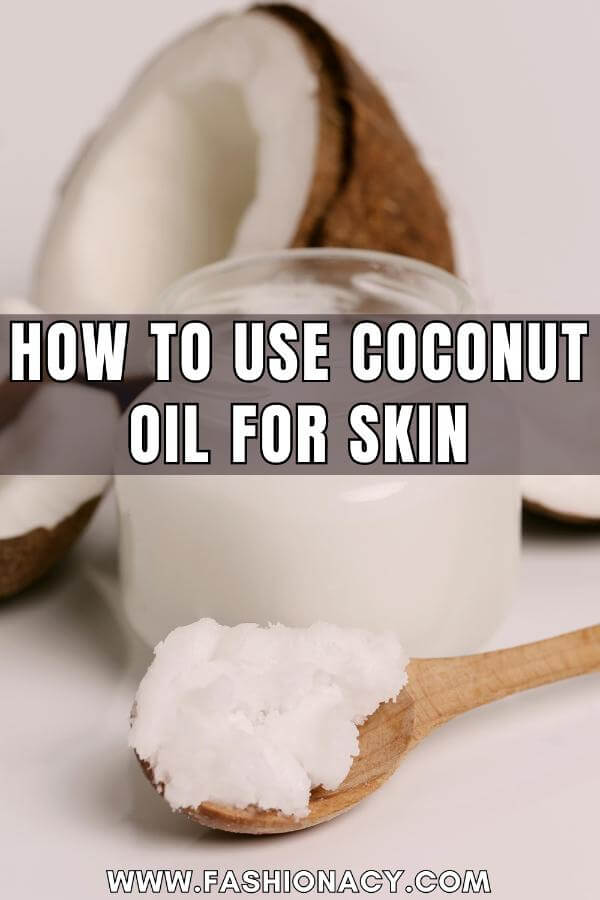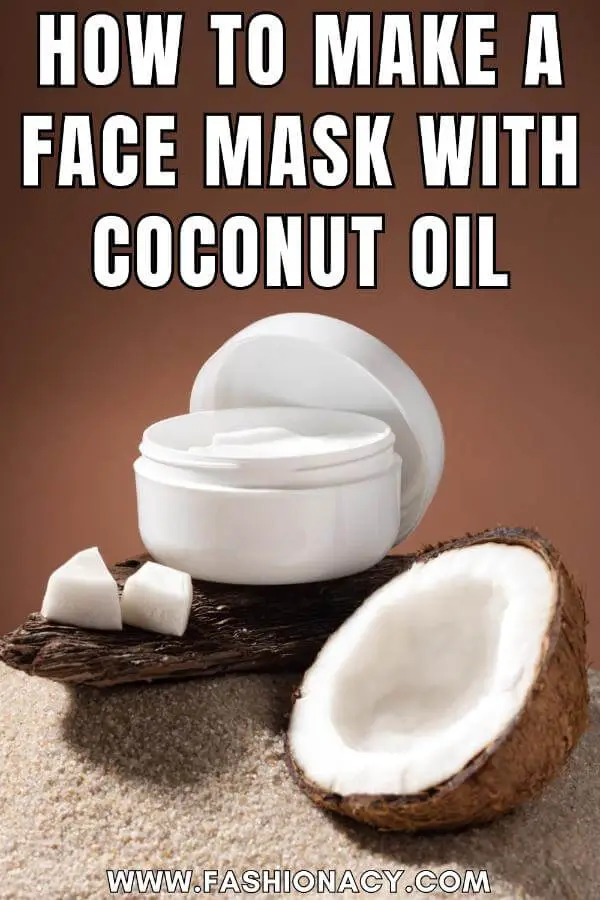
In recent years, there has been a resurgence of interest in natural remedies for skincare, with coconut oil emerging as a popular choice among beauty enthusiasts and dermatologists alike.
Renowned for its multifaceted benefits, coconut oil is not only a kitchen staple but also a potent elixir for nurturing and rejuvenating the skin.
From moisturizing dry patches to combating signs of aging, the therapeutic properties of coconut oil have been cherished across cultures for centuries.

Let’s delve deeper into the science-backed benefits of coconut oil for skin health.
- Deep Hydration and Moisturization: One of the primary reasons behind coconut oil’s efficacy in skincare lies in its exceptional moisturizing properties. Unlike many commercial moisturizers that contain synthetic additives, coconut oil is a natural emollient that penetrates deeply into the skin, replenishing lost moisture and forming a protective barrier to prevent further dehydration. Its high concentration of fatty acids, particularly lauric acid, enables it to lock in moisture, making it an ideal solution for individuals struggling with dry, flaky skin.
- Nourishing Antioxidants: Coconut oil is rich in antioxidants such as vitamin E, which play a crucial role in neutralizing free radicals that contribute to skin damage and premature aging. These antioxidants help combat oxidative stress, reducing the appearance of fine lines, wrinkles, and age spots. Regular application of coconut oil can thus aid in preserving the skin’s youthful suppleness and promoting a radiant complexion.
- Anti-inflammatory Properties: Inflammation is a common underlying factor in various skin conditions, including acne, eczema, and psoriasis. Thanks to its anti-inflammatory properties, coconut oil can help alleviate redness, swelling, and discomfort associated with these conditions. By soothing irritated skin and promoting healing, coconut oil offers a gentle yet effective solution for managing inflammatory skin disorders, promoting overall skin health and comfort.
- Antibacterial and Antifungal Action: The presence of medium-chain fatty acids, particularly lauric acid, in coconut oil grants it potent antibacterial, antiviral, and antifungal properties. These properties make it an excellent natural remedy for addressing acne breakouts, fungal infections, and other microbial skin concerns. By inhibiting the growth of harmful bacteria and fungi, coconut oil aids in maintaining a balanced microbial environment on the skin’s surface, reducing the risk of infections and promoting clearer, healthier skin.
- Makeup Remover and Cleanser: Coconut oil serves as a versatile cleansing agent, effectively dissolving stubborn makeup, dirt, and impurities without stripping the skin of its natural oils. Its gentle yet thorough cleansing action makes it suitable for all skin types, including sensitive and acne-prone skin. Additionally, coconut oil’s emollient properties help hydrate the skin while cleansing, leaving it feeling soft, smooth, and refreshed.
- Sun Protection and After-Sun Care: While coconut oil cannot replace dedicated sunscreen, it offers mild sun protection due to its natural SPF of around 4-5. When used in conjunction with a broad-spectrum sunscreen, coconut oil can provide an added layer of defense against harmful UV rays. Furthermore, its soothing properties make it an excellent choice for post-sun exposure, helping to relieve sunburns and minimize inflammation while replenishing moisture to parched skin.
- Promotes Wound Healing: Studies have shown that coconut oil exhibits wound-healing properties, accelerating the skin’s repair process and reducing the risk of scarring. Its ability to enhance collagen production and improve skin elasticity contributes to faster wound closure and smoother skin regeneration. Whether used on minor cuts, abrasions, or surgical incisions, coconut oil can aid in promoting optimal healing and restoring the skin’s integrity.
In the realm of natural skincare remedies, coconut oil stands out as a true powerhouse, offering a myriad of benefits for skin health and beauty. From its unparalleled moisturizing prowess to its potent anti-inflammatory and antimicrobial properties, coconut oil addresses a wide range of skincare concerns with gentle yet effective action.
Whether applied topically as a moisturizer, cleanser, or soothing balm, or incorporated into homemade skincare formulations, coconut oil continues to reign supreme as a beloved ally in the quest for radiant, nourished skin. Embrace the wonders of coconut oil and unlock the secret to timeless beauty, naturally.
How to Use Coconut Oil For Skin

Using coconut oil for skin care is simple and versatile, offering various application methods suitable for different skincare needs. Here’s a guide on how to effectively incorporate coconut oil into your skincare routine:
- Pure Coconut Oil as a Moisturizer:
- After cleansing your face or body, scoop out a small amount of organic, virgin coconut oil onto your fingertips.
- Gently massage the oil onto damp skin using upward circular motions until fully absorbed.
- Focus on areas prone to dryness, such as elbows, knees, and heels, for deep hydration.
- Use daily, preferably after showering or bathing, to lock in moisture and keep the skin soft and supple.
- Coconut Oil as a Makeup Remover:
- Take a small amount of coconut oil and warm it between your palms until it melts into a liquid.
- Apply the melted oil onto your face, focusing on areas with makeup, such as the eyes and lips.
- Massage the oil gently in circular motions to dissolve makeup and impurities.
- Wipe away the oil and makeup residue using a soft cotton pad or a damp cloth.
- Follow up with your regular cleanser to remove any remaining traces of oil and makeup.
- Coconut Oil as a Cleanser:
- Similar to using coconut oil as a makeup remover, apply a small amount of melted coconut oil onto your face.
- Massage the oil into your skin using gentle circular motions to loosen dirt, excess oil, and impurities.
- Rinse your face with lukewarm water to emulsify the oil and wash away debris.
- Pat your skin dry with a clean towel and follow up with toner and moisturizer as needed.
- Coconut Oil as a Body Scrub:
- Mix equal parts of coconut oil and natural exfoliants such as sugar or sea salt in a bowl to create a DIY body scrub.
- Apply the mixture onto damp skin, focusing on rough areas like elbows, knees, and feet.
- Gently massage the scrub in circular motions to slough off dead skin cells and promote circulation.
- Rinse off with warm water and pat your skin dry.
- Enjoy the smooth and rejuvenated feeling of your exfoliated skin.
- Coconut Oil for Sunburn Relief:
- If you’ve spent too much time in the sun and ended up with a sunburn, coconut oil can help soothe and moisturize your skin.
- Apply a thin layer of coconut oil directly onto the affected areas to relieve discomfort and reduce inflammation.
- Repeat as needed to keep the skin hydrated and promote healing.
- For added cooling relief, consider mixing coconut oil with aloe vera gel or storing the oil in the refrigerator before application.
- Coconut Oil as a Night Treatment:
- Before bedtime, apply a small amount of coconut oil onto clean, dry skin as a nourishing overnight treatment.
- Focus on areas prone to dryness or fine lines, such as around the eyes and mouth.
- Allow the oil to absorb fully into your skin overnight, replenishing moisture and supporting skin repair processes.
- Wake up to a refreshed and rejuvenated complexion in the morning.
- Customized Coconut Oil Blends:
- Experiment with blending coconut oil with other natural ingredients like essential oils, honey, or yogurt to create customized skincare formulations.
- Tailor your blends to address specific skin concerns, such as acne, aging, or sensitivity.
- Perform patch tests before applying new blends to ensure compatibility and minimize the risk of irritation.
Incorporating coconut oil into your skincare routine can provide a nourishing and holistic approach to achieving healthy, glowing skin. Whether used alone or in combination with other skincare products, coconut oil offers a natural solution for addressing various skin concerns and promoting overall skin health.
Creating a DIY face mask with coconut oil is a fantastic way to harness its moisturizing and nourishing properties while pampering your skin. Here’s a simple recipe for making a rejuvenating coconut oil face mask:
Ingredients:
- Organic Virgin Coconut Oil: 1 tablespoon
- Raw Honey: 1 tablespoon
- Optional Additions:
- Ground Oats: 1 tablespoon (for gentle exfoliation)
- Lemon Juice: 1 teaspoon (for brightening and clarifying)
- Yogurt: 1 tablespoon (for soothing and balancing)
Instructions:
- Prepare Your Ingredients:
- Measure out the desired amount of coconut oil and honey. If you’re using any optional additions, have them ready as well.
- If your coconut oil is solid at room temperature, gently warm it in the microwave or over a double boiler until it liquefies. Be careful not to overheat it.
- Mix the Ingredients:
- In a small bowl, combine the melted coconut oil and raw honey.
- If you’re incorporating any additional ingredients like ground oats, lemon juice, or yogurt, add them to the mixture and blend well until you achieve a smooth, uniform consistency.
- Adjust Consistency (Optional):
- Depending on your preference, you can adjust the consistency of the mask by adding more coconut oil for a smoother texture or more honey for extra hydration and stickiness.
- Feel free to customize the mask according to your skin’s needs and sensitivity. For example, if you have sensitive skin, you may want to omit lemon juice or reduce its quantity to avoid potential irritation.
- Apply the Mask:
- Before applying the mask, cleanse your face thoroughly to remove any makeup, dirt, or impurities.
- Using clean fingertips or a cosmetic brush, apply an even layer of the coconut oil face mask to your face, avoiding the delicate eye area.
- If desired, you can also extend the mask down to your neck and décolletage for comprehensive skincare benefits.
- Relax and Rejuvenate:
- Once the mask is applied, take some time to relax and allow the nourishing ingredients to work their magic on your skin.
- Find a comfortable position and unwind for 10-15 minutes while the mask absorbs into your skin, providing deep hydration and replenishment.
- Rinse Off Thoroughly:
- After the recommended duration, gently rinse off the face mask with lukewarm water.
- Use gentle, circular motions to massage the mask off your skin, ensuring that all residues are removed.
- Pat your skin dry with a soft towel and admire the refreshed and radiant complexion revealed beneath.
- Follow Up with Skincare Routine:
- After removing the mask, follow up with your regular skincare routine, such as toner, serum, and moisturizer, to lock in the benefits of the mask and keep your skin nourished and hydrated.
- Storage and Shelf Life:
- If you have any leftover mask, you can store it in an airtight container in a cool, dry place for future use.
- Keep in mind that homemade masks without preservatives may have a shorter shelf life compared to commercial products, so it’s best to use them within a few days.
By incorporating this DIY coconut oil face mask into your skincare regimen once or twice a week, you can indulge in a luxurious spa-like experience while promoting healthy, glowing skin naturally. Feel free to adjust the ingredients and customize the mask to suit your skin’s unique needs and preferences.




